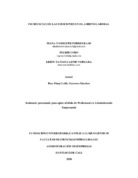Mostrar el registro sencillo del ítem
Incidencias de las emociones en el ámbito laboral
| dc.contributor.advisor | Guerrero Sánchez, Diana Leidy | |
| dc.creator | Torres Baos, Diana Yamileth | |
| dc.creator | Cobo, Ingrid | |
| dc.creator | Lenis Vergara, Leidy Tatiana | |
| dc.date.accessioned | 2021-04-21T23:47:02Z | |
| dc.date.available | 2021-04-21T23:47:02Z | |
| dc.date.created | 2020 | |
| dc.identifier.uri | http://hdl.handle.net/20.500.12237/2044 | |
| dc.description | Las emociones son estados afectivos que se experimentan, son respuestas o reacciones fisiológicas ante cambios que se producen en el entorno, se basan en experiencias, percepciones, actitudes y creencias que se usan para percibir y valorar una situación concreta, son estímulos rápidos e impulsivos que pueden ser positivos o negativos. Este documento tiene como propósito analizar la incidencia que tienen las emociones en el ámbito laboral y cómo afectan de manera positiva y negativa dependiendo del autocontrol que el individuo logre sobre ellas. Se estructuró una encuesta que contiene preguntas que analizan los riesgos psicosociales a los que están expuestos los trabajadores en las empresas y así conocer cómo influyen las emociones en su ámbito laboral. Los resultados obtenidos en esta investigación determinan factores de estrés, ansiedad e inconformidad que presentan la muestra, lo que permite impulsar la prevención de posibles riesgos en cuanto a enfermedades físicas, emocionales y lograr el desarrollo del estado de ánimos adecuados en los trabajadores que potencialicen su desempeño y productividad laboral. Este trabajo permite concluir que las emociones repercuten directamente en el ámbito laboral, por ello es muy importante que las empresas conozcan, los estados de ánimo de los empleados, para poder hacer acompañamiento y aplicar herramientas que les sean útiles y trasformar así emociones negativas en positivas, que garanticen el desarrollo de las funciones oportunamente, en el ámbito empresarial. | spa |
| dc.description.abstract | Emotions are affective states that are experienced, they are physiological responses or reactions to changes that can happen in a environment. They are based on experiences, perceptions, attitudes and beliefs that are used to perceive and value an specific situation, also are quick and impulsive stimulations that can be positive or negative. The purpose of this document is to analyze the incidence of emotions in the workplace, and how they affect positively and negatively depending on the self-control that the individual achieves over them selve. A survey was structured with questions that analyze the psychosocial risks to which companies workers are exposed, in order to find out how emotions influence their workplace environment. The results obtained in this research determine the stress, anxiety and non-conformity factors that the sample presents, which allows promoting the prevention of possible risks in terms of physical and emotional illnesses. Also to achieve the development of an adequate state of mind in workers that enhances their performance and labor productivity. This work allows us to conclude that emotions have a direct impact in the workplace, so it is very important that companies know the state of mind of their employees, in order to accompany and apply tools that are useful to them, thus seeking to transform negative emotions in positive emotionsm that guarantee, in a timely manner, the development of functions in the business environment. | spa |
| dc.format.mimetype | application/pdf | spa |
| dc.subject | Inteligencia emocional | spa |
| dc.subject | Emociones ámbito laboral | spa |
| dc.title | Incidencias de las emociones en el ámbito laboral | spa |
| dc.subject.subjectenglish | Intelligence thrills | spa |
| dc.subject.subjectenglish | Workplace emotions | spa |
| dc.rights.accessRights | info:eu-repo/semantics/openAccess | spa |
| dc.creator.degree | Administrador de empresas | spa |

